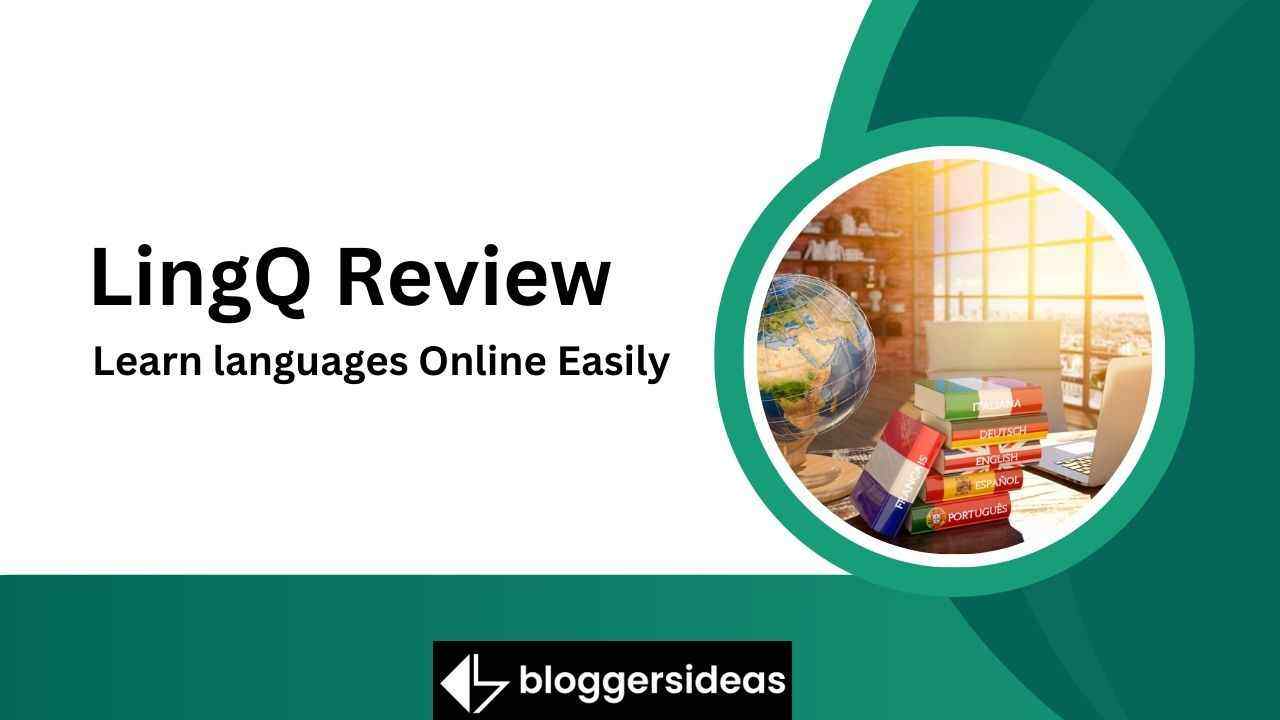In the intermediate phase of learning a language, reading in your target language is one of the best ways to acquire new vocabulary.
Reading is an important part of my learning strategies for each of the languages I learn. I chose mainly to work with physical books instead of electronic books and made pencil notes after searching for every word. The process was quite tedious, but I had not found a more efficient method for me.
Few years ago, I created a LingQ account, but I was not ready to waste time learning it. I quickly forgot him. I recently started watching Steve Kaufmann’s videos about his Korean-language challenge, and he reminded me to come back.
I thought, because I like reading and being in the intermediate phase, it would be the perfect way to move forward.
And he was right
LingQ is officially my new favorite learning tool. My linguistic life is changing forever. Read More About LingQ Review in detailed below:
LingQ Review 2024: Is It Worth??
Detailed LingQ Review
For the first time, LingQ needs a configuration. To learn how to use LingQ, the learning curve is faster than other applications that I use on a regular basis, but it’s worth it. Since I last tried, some updates have been made to the system. So it’s a bit more intuitive than before, but the user experience can be further improved.
LingQ has a number of features that enable language learners to develop the four basic language skills: listening, reading, speaking, and writing. The system contains a plethora of content, but you can also import external content if you want.
Thanks to the platform you can now learn Spanish, French, Chinese, Russian, Japanese, English, German, Portuguese, Italian, Korean, Swedish, Dutch, Greek, Polish, and Esperanto. They also have several beta languages, including Arabic, Czech, Finnish, Hebrew, Latin, Norwegian, Romanian, Turkish, and Ukrainian.
The Features of LingQ Review
As I mentioned at the beginning of this article, reading is one of my favorites for learning a new intermediate(and beyond). Books and other readings not only provide a context for new words but also provide them in a way that is easier to understand than other tools. Movies and TV shows can be interesting for learning new vocabulary.
However, this is only necessary if you have the patience to move quickly and backward, or if you have enough hearing to understand quickly. You can workbooks at your own pace.
To be honest, before I know it, I thought about it, I knew import option, LingQ I agreed that it was a decent platform and something I could certainly use, but there are many similar tools that offer similar services.
Then I discovered the import option.
The import option is simply mind-blowing and you have completely sold it to me in LingQ. I was able to import the electronic books in Spanish, French, and Chinese that I had in LingQ. Now my studies and my reading are much more efficient.
I will definitely buy a lot more material in digital format, as LingQ is available to me as a resource.
Another feature that I really like is the number of words. If you read along LingQ, you get the total number of words you know and the number of words to study.
That’s very motivating for me. I can say “wow, I already know 1,000 words in Spanish and have just started with the language”. Or “Darling, I really have to check it, there are 700 LingQ for Chinese”. It’s good to have an approximate number for the total number of words you know in one language. So I enjoyed the counters.
Another great feature that has saved me from working with printed books is the LingQ built-in revision feature. But not as you can think.
Instead of highlighting new words on my Kindle, searching for them later (or searching for them immediately, and still taking notes), I can instead save a new vocabulary in LingQ. Even LingQ lets you use a combination of the four verification tools, Multiple Choice, Cloze, Cards, or Dictation.
I tried it, but I prefer Memrise. And that’s fine because LingQ allows me to export my list as a CSV file and then import it into Memrise.
LingQ Review Vocabulary Tools
After you create a LingQ, the word is automatically sent to the LingQ vocabulary tools.
You are
- Multiple Choice
- near
- card
- dictation
Exporting Your LingQ to Memrise
LingQ can take over my word list and the examiner. That the platform is flexible enough to add or remove what I need and to use it the way I think most suitable as a language learner. I’ll give them 10/10 for sure.
What I thought was better
In the mobile application, you have to click on each word to turn it into a LingQ. This is a little uncomfortable, especially when there are many new words on the page. However, this feature was somewhat redeemed by the fact that scrolling to the next page marks all words not so controlled.
I also noticed problems loading or syncing courses on my phone (the content was not there) and I had to re-import some of the content. His team was incredibly useful and everything went well so I can not blame them.
A warning if you use such tools.
Although I like reading to learn new words in context, here’s an important thing to keep in mind. And that is the context.
If you’re not careful, you can look at the word of the word by word instead of reading them. As the tool worked, I discovered that if I did not focus on reading, I’d look at just about every word to judge if I knew it or not, and I completely lost the story.
It’s not exclusive to LingQ, but I’ve noticed that I’ve done a bit more than usual because of the nature of the platform. In fact, in some of the simpler lessons, I have completely ignored familiar words and simply read unlabeled words.
That kind of defeat of the purpose of this tool, so I went back and read.
Tools for Creating LingQ Vocabulary
As I mentioned earlier, if you follow a lesson or hear the LingQ audio and find a word you do not know, you can add it as LingQ. ,
Each LingQ has a score between one and four:
- New (newly added as LingQ)
- I do remember not
- Not Sure
- Learned
LingQs learn? In the vocabulary of LingQ.
There are four different vocabulary learning tools:
The tools are:
- Flashcards
- Masking test
- Dictation
- Multiple options
All tools use a spaced repeating system to select the words you want to try. This is one of the most effective ways to learn vocabulary because it means you have to remember the words if you forget them.
Let us see each of the reminder tools.
LingQ Flashcardsmemory
This is a simple card game in which the word in French appears on the one hand as follows:
You can change the configuration to invert the memory cards so that the English version is displayed and you have done this. Guess the French translation.
Memory cards remind me to use one of my favorite language tools, Anki. The advantage is that in the LingQ system, the creation of memory cards is much faster than with Anki. Memory cards are automatically created in LingQ if you tell LingQ in one of the lessons that you do not know a word.
LingQ Freeze Tests Complete LingQTool
with the Lock to create a sentence in your target language from a selection of words as follows:
The word you need to add the sentence is always part of your LingQ. This is useful for testing your new vocabulary in context.
LingQ Dictation toolsets
DictationListen to one of the words you learn and write it.
I found the tool very strict and intolerant regarding spelling errors or typos. Still, it’s a great way to develop your listening and writing skills at the same time.
LingQ Multiple
Choice Test With the multiple-choice test, you can choose the correct translation of a word from the four options shown. Here is an example:
I found that it seemed to use memory cards, though something simpler.
Other LingQ Tools: Speaking and Writing tools
The primary goal of LingQ in its teaching and vocabulary is to read, hear and learn a new vocabulary. All this is included in the standard monthly subscription.
LingQ also gives you the opportunity to improve your language skills by talking to native speakers and having your speakers review your letter. To have a conversation, you need to buy LingQ points. For LingQ subscribers, it’s $ 20 for 2,000 points.
This will give you an hour of conversation with a caller. You can also earn points by offering your services as a speaker in your native language.
I paid points to have a conversation with a native speaker in LingQ.
Do not forget that LingQ is not really a platform where language teachers earn their living. Most people talk to you to earn points so they can learn their own language (unlike other after-school services, no income).
Therefore, there are not many conversation partners. However, I found a conversation partner at a time that worked well for me and I found it useful and supportive.
Pros and Cons
Pros
- It’s easy to add your own content, making reading more fun.
- The content is very diverse and comes from many places.
- Finding words is quick and easy.
Cons
- Very little content is original. A lot was downloaded by users from other places.
- The free version is extremely limited.
How much is LingQ? (Read Full LingQ Review Summary)
A LingQ premium account $10 / month.
For this price you will receive:
- Imported unlimited number of lessons with
- 50% discount
- Vocabulary Import / Export Points
- Access to Android and iOS applications
- as well as all other LingQ features (except Skype lessons and text corrections)
There is also a plus Plan exactly the same premium account except it gets 3000 points per month. You can use these points for additional LingQ features: Skype lessons, text corrections, and updating your avatar.
The plus plan costs $ 39 / month.
What happens to the free plan?
You can also sign up to receive a free LingQ account.
The problem is that the amount of LingQ you can do is pretty limited: 20. You can only import 5 lessons.
With the free Plan, you can see what LingQ looks like. But do not expect much value.
Quick Link
- Brian Tracy Books & 6 Figure Speaker Discount Coupon Code 2024 30% Off
- [Updated] Top 10 Best Conversion Rate Optimization Tools 2024
- Ed2go Discount Coupon Code 2024 Courses Starting @$149 Hurry Up
- {Updated}List of Top 10 Programming Languages to Learn in 2024
FAQs
✅Is LingQ any good?
It provides a platform to learn any language. Tools provided by LingQ are good quality and efficient. Core tools of LingQ are lessons and vocabulary building.
$$ How much does LingQ cost?
LingQ premium subscription is $12.99 per month.
🔢Which app is the best for learning languages?
The best learning apps are Rosetta Stone, Duolingo, Memrise or Busuu, etc.
👉What is the hardest language to learn?
Mandarin Chinese is the Hardest Language to Learn. It is the most widely spoken native language in the world. There are number of reasons for being a challenging language.
Conclusion: LingQ Review 2024: Is It Worth?
I’m sure you’ve been able to do that since I’m organizing the Reading Challenge, which I like to read. And the things you love in your target language are not only an excellent way to enjoy your studies better, but also to be more effective (two birds, one stone). LingQ is a reliable platform that you should trust and get started right away.
I absolutely to continue using LingQ Review. I have added it to the learning process. I ‘ll definitely change the way I read my strategy now that I’m a paid member (yes, I’ve paid my own subscription and no, it’s not a sponsored message!).
As I said, I like the versatility of LingQ Review and I especially like the fact that it’s compatible with most of the languages I’m learning. This is definitely one of my new favorite learning tools. I recommend











